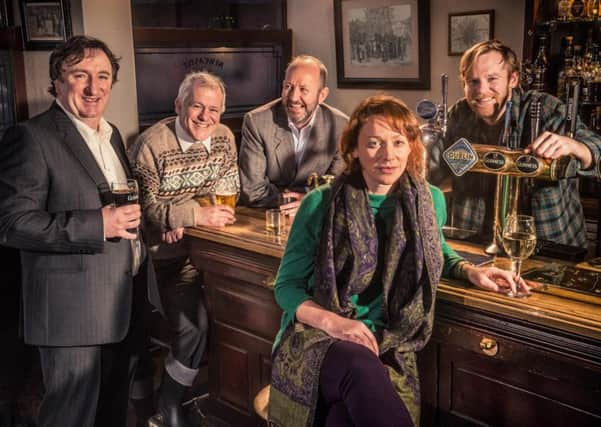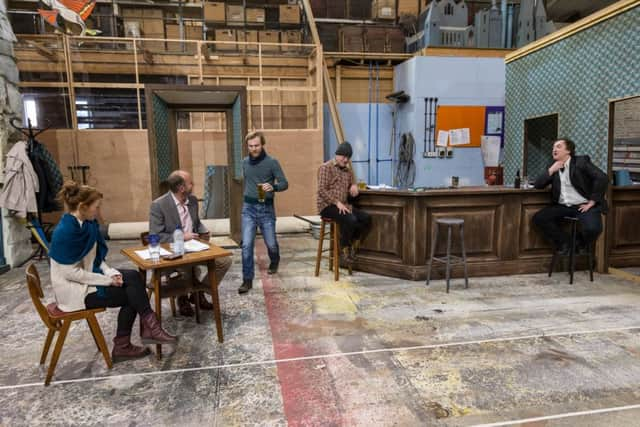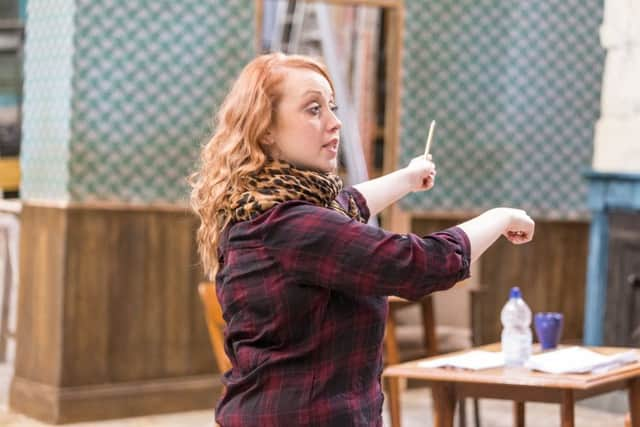The Weir, a spectral play set in a pub that goes down easy


It’s theatre tailor-made for a winter evening. The fire is lit in the pub, the pints are poured, and the ghost stories begin. Amanda Gaughan, directing a new production of Conor MacPherson’s The Weir at the Lyceum, says: “It’s perfect in January, post-Christmas, sitting at a log fire, telling stories. As soon as we got the rights, we knew this was the right slot for it.”
She’s saying this in a pub, of course, where we – Gaughan and I, along with two of the five actors, Frank McCusker and Darragh Kelly, are squeezed warmly into a booth, drinks in front of us. But the Traverse Bar is a far cry from the pub in the play, Brendan’s Bar, in the rural hinterland of Leitrim, where the landlord stops for a pint with his cronies, Jack, Finbar and Jim – and newcomer Valerie helps turn an evening’s storytelling into one of revelations.
Advertisement
Hide AdMacPherson’s smash hit, written when he was just 26, started out in a 60-seater space at London’s New Ambassadors in the summer of 1998, and was so successful it went on to run for two years on the West End. A recent revival at the Donmar featuring Brian Cox, Ardal O’Hanlon and Dervla Kirwan brought another West End transfer last year. Sitting mid-way through the Lyceum’s wide-ranging 50th anniversary programme, it’s that rare gem: a contemporary classic.


Gaughan says the Lyceum made an early decision to seek out an Irish cast: “I’ve been asking them a lot of questions,” she says. “I would have missed so much about this play if I didn’t have this cast.” Kelly, who plays quiet man Jim, adds: “There are remote parts of Ireland [today] where you would recognise the life, the attitudes, the barfly-ness of these characters. When you have to mine that kind of thing, having access to that shorthand saves a lot of time, and adds accuracy.”
The Weir is possessed of several winning ingredients: the pub setting, the rich characters who always seem to have more to give, its clever mix of laughter and poignancy, not to mention some spooky tales and a willingness to leave some questions unanswered. But it is also much more than a crowd pleaser. “When I read it, it was a real a page-turner,” says Gaughan. “It has light and shade in it, you laugh with it and then you’re also horrified by some of the stories. It’s brilliantly written, but it creeps up on you. You end up wondering: how did we get from fun banter to a much lonelier and yet generous place?”
Kelly says the play appealed to him immediately when he saw it during its first run in London. “MacPherson has a lovely ear for that kind of dialogue – they are inarticulately articulate, these men. I thought it looked like a really comfortable old shoe, I wanted to put it on. I loved its gentleness and its surprise, because it does carry its own development.”
MacPherson has captured, with pinpoint accuracy, the friendly, occasionally edgy banter of men who know one another well. Finbar, the local boy made good, now living in the nearby “big town” of Carrick, strikes sparks off Jack, the local mechanic. McCusker, who plays Finbar, says: “There’s an underlying tension because of the fact that he has gone off, done well, come back, a bit of that: who do you think you are? And he’s ready for it. I grew up in a country area myself [Co. Fermanagh in Northern Ireland], and when you go back, your antennae are out for who is going to try and pull the rug from under you.


“People behave in an almost familial way with each other, quite openly combative at times. It can all be done in a guise of humour, but in actual fact there are little bitternesses and jealousies and insecurities bubbling away all over the place. Yet you can be sure if these four were all up in Dublin at a match and someone said something to any one of them, they’d be thick as thieves.”
Advertisement
Hide AdFinbar, he says, has the successful man’s classic ambivalence to the place he came from, hankering after it but hating it at the same time. “He lives in the big town, and his wife is presumably shopping in Brown Thomas in Dublin, but he probably doesn’t feel comfortable there either. He uses the word ‘loneliness’ at one point. Maybe the tragedy for him – his little one-fifth of the tragedy in the play – is that he doesn’t quite fit in either place.”
For all its good humour, The Weir has an undercurrent of loneliness and loss. Michael Billington has written of MacPherson that “no one is better… at dramatising the loneliness of the Irish male.” The play’s ghost stories are less things-that-go-bump-in-the-night than very personal acts of haunting. McCusker says: “What I think the ghost stories represent is that, in each of the people who tell them, they are really about some other truth, a loss or a loneliness, the inability to describe your loneliness, which you project on to something that may or may not have happened.”
Advertisement
Hide AdThe four locals might be trying to rattle newcomer Valerie (Lucianne McEvoy) with their spooky tales, but she has a tale of her own to tell. Gaughan, one of Scotland’s up and coming young directors whose first production as an associate artist for the Lyceum was last year’s Hedda Gabler, says: “One thing I like as a theatre-maker is strong female roles. Valerie is brilliant because she’s mysterious, she hasn’t got a connection to any of the men in the play, she’s not a girlfriend or a wife or mother. This night would not happen without her.”


For Gaughan, working with designer Francis O’Connor, sound designer Michael John McCarthy and lighting designer Simon Wilkinson, one of the big challenges of the play is how to recreate the intimacy of the pub setting in large proscenium-arch theatre: “We’re having lots of conversations about how we make sure that everybody in that upper circle feels like they’re in that pub.”
The pub is a recognised setting in Irish plays, almost as much as the drawing room in Ibsen or Noel Coward, used widely by playwrights from Synge to O’Casey to Tom Murphy. McCusker says: “If you’re an Irish writer, the pub is irrestible, it’s where everybody comes together, and where, with alcohol and conversation and the predisposition that Irish people have to talk, that you’re going to have a lot of things to mine.”
• The Weir is at the Royal Lyceum, Edinburgh, until 6 February, www.lyceum.org.uk